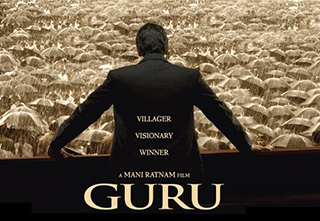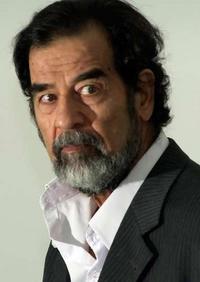Guru
Cast: Abhishek Bacchan, Aishwarya Roy, R. Madhavan, Mithun Chakrabarty, Music: A R Rahman, Direction: Mani Ratnam
Namratha Joshi, the film critic from Outlook wrote this about Yuva, Ratnam's last movie, 'Yuva is not a good film, it pretends to be a good film'. Thinking about it there is something distinct I noticed while watching Mani Ratnam's Guru. It makes the audience feel that they are watching a good film, while presenting them a normal Bollywood fare with usual potboiler stuff in a more refined and technically fine format.
That said, Guru is a watchable film. Political diplomacy aside, It is about Dhirubai Ambani told in a fictitious setup with fictitious names. Here the protagonist is actually called 'Gurubai'. The rest of the characters are left for your imagination. As the movie progresses, you suddenly discover someone, point out and yell, 'hey that's Nusli Wadia'. And, 'hey, that's Goenka'. Well, interestingly enough, at some poignantly intelligent moment, the audience even yells 'hey that's Mani Ratnam'.
Guru has excellent cinematography, good songs, powerful, yet unnecessary background score, and sophisticated artwork. This is backed by Abhishek's life-time performance ably backed by deliberately underplayed contributions by Mithunda and Madhavan. Abhishek has notched a few scales higher in his profile as his role is going to be talked about for a very long time. I didn't bother myself much with either the look-and-feel or the performance of Aishwarya.
That said, I have certain problems with Mani Ratnam's approach to film making, which I have stated in my earlier blogs. Guru follows all of them. I noticed another issue here of telling a true story in a fictitious setting. I didn't like the guessing game idea for a movie watching experience. I would have liked if Ratnam had gone to Ambani brothers, secured an official permission and named the film 'Dhirubai'. True that the real-life stories haven't done well in India and often turned controversial. But camaflouaging them in a fictitous setting is not a trait of a brave and good filmmaker either. It certainly doesn't gel with the director who, in his earlier films, with outrageous courage, made his lead character fall in love with a sex worker, and introduced a five-year old, mentally challenged kid as the protagonist.
Curiously too, Guru reminded me of several of Ratnam's earlier movies, predominantly Nayagan and Iruvar. It seemed like the director watched these two movies, felt he hasn't done justice to some scenes and decided to better them in Guru.
Guru will whet the appetite of people who crave for good films but don't have patience for the same.
Wednesday, January 24, 2007
Friday, January 19, 2007

Saddam
Ever since he was hanged, I have been meaning to write about Saddam's execution. But the responses to the execution have been universally banal at best and silly and laughable at worst. Everyone, universally, condemned the hanging, criticised the hastened trial and some, at the height of hyperbole, wanted Bush hanged instead. I thought I would wait a while more to see if there were alternate viewpoints to this but to no avail. Then I decided to write one myself.
I have nothing against Saddam's execution. Even those who opposed the hanging only questioned the manner of the trial and never said he was innocent or a clean man. Everyone's aware of his massacre of Kurds, his excited (and US sponsored) war with Iran that killed millions and his enmity with Shias that resulted in murders by thousands. This apart, the number of people who were jailed, tortured and killed simply because they opposed his ruling is countless. During the Gulf war, while US and Iraq were fighting along the Kuwait borders, Saddam sent a few missiles towards Israel in the hope that an instigated Israel will trigger an Arab war. Ever since the Gulf war, around five million children died in Iraq due to lack of medical assistance because of the sanctions. Ironically the critics slammed US for imposing these sanctions but did not question why Saddam did nothing to help lift these sanctions and watched them die. As Indian constitution states, capital punishment is awarded to rarest of the rare crimes and what happened is even above being called rare.
The fact that the Shia observers, during his execution, ridiculed him and passed lewd comments would not erase all these heinous acts by one of the highly feared dictator of the late 20th century.
My thinking is Saddam's elimination is essential for the post 9/11 world that has a renewed approach to terrorism. Terrorism cannot be eliminated totally by counter-insurgency but there is no other way to talk to terrorists. Our offer to talk to them is often seen as a sign of weakness. As such there is nothing we can really talk and resolve with them. Their demands often are destruction and recognition for racism and religious fanatism. Talks really cannot resolve these things. Post 9/11, they were being chased away from every part of the world and were looking eagerly for a safe haven. Iraq could easily have provided it considering Saddam's vengeance against US. With his execution, this has been prevented.
Again, this will not stop the terrorists. They may become angrier, more vigorous, and much more resolved. Fifty years of aggression towards terrorists hasn't helped Israel much. Just as many years of softness haven’t helped India either. We have to cut as many lifelines as possible and make the life of terrorists tedious. I consider Saddam's execution as one such act.
Saddam lived by the gallows. It is only fare that he died by it.

